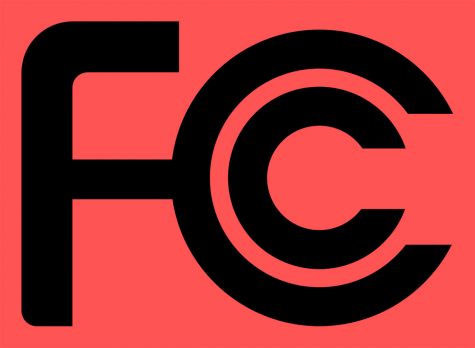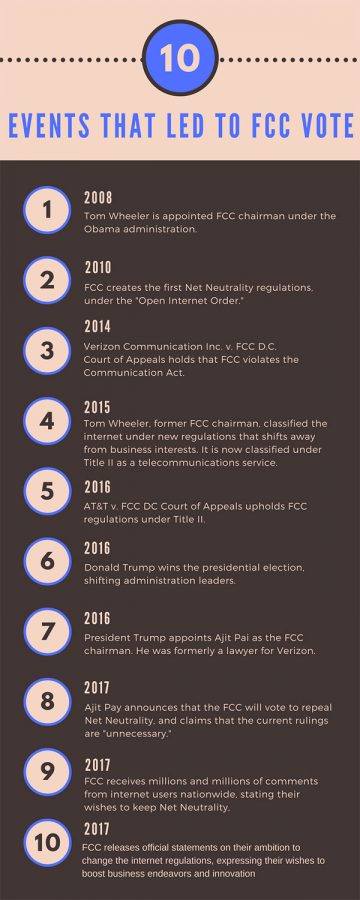The war behind the screen
Internet must remain open and free to sustain equality
December 13, 2017

In what is to be the United States’ greatest contemporary battle between consumerism and capitalism, the Federal Communications Commission votes tomorrow on abandoning the provisions of Net Neutrality guaranteed by Title II under the Obama Administration.
Though you may or not find yourself scouring the edges of the internet, on Instagram or Facebook, on Spotify or Soundcloud, your presence here indicates that the internet is important to you. We are facing a reality ascertaining that this website, its articles and its content, that enjoy the privileges and accessibility granted under the premises of free and open internet, may not be here this time next year.
Repealing Net Neutrality opens a wormhole for Internet Service Providers to level monopolies on American internet. The FCC under Obama’s Administration made laws to prevent this aggrandizement of bandwidth speed, opening a long battle for Net Neutrality.

Net Neutrality advocates consider the infrastructure of internet delivery– speed, video streaming and audio streaming– as a utility and not as a commodity, seeking to classify it as a type of common carriage under the 1996 Telecommunications Act, and apply the same rules to the internet that roads, electricity and water abide by.
But old wounds have reopened under the ambition of Republican Ajit Pai, president Trump’s appointment as the head of the FCC. Pai’s proposed legislature threatens to rewrite the fight of a fight that began as early as the fight for free radio. If the legislature is passed by the commission, three Republicans to two Democrats, then ISP’s obtain the power to discriminate bandwidth speed and might force you to pay for it.
Comcast, Verizon and AT&T among others, could slow and halt access to their rival websites and run small, nonprofit businesses into the ground, if they can’t afford to make payments for their bandwidth speed.
The internet existed this way for Americans until AOL revolutionized open internet in the late 1990s. It seems convoluted and a perversion of capitalism, a crude version of survival of the fittest for monopolies to ruin smaller business ventures, but surely we are better than animals.
Students won’t be able to create independent websites for their research projects. Small businesses, clothing lines, Tiger Times, our online newspaper, will face a reality where our online presence is tolled by ISPs with histories of black capitalism.
Most legislation is a type of rule that enables freedom, take for instance the bill of rights, but our legislators also retain the ability to restrict freedom.
Eliminating Net Neutrality and allowing ISPs to set up toll booths on the internet’s highway will not benefit but a few corporate executives who are geared to benefit this more than the consumer. In Portugal, a compartmentalized internet exists as the extant of a internet that never saw their own AOL.
Pai defends his support of ISPs by saying that regulating the internet freezes business models and limits the creative experimentation that small business like AOL experienced in an internet without rules, but ISPs don’t have a track record for playing nice when it comes to broadband; they abuse their power for profiteering.
The FCC is days away from killing the free and open internet. Those of us who use the internet for resistance can't afford to lose this fight. #BreakTheInternet pic.twitter.com/lcC5487lI7
— ACLU (@ACLU) December 12, 2017
You wouldn’t want your burger cooked to 85 degrees if it cut the cooking time in half, so why pay for half for the internet at a cheaper price when you can pay for an open internet at the price you do now? This legislation holds ISPs accountable. And now, Pai crosses the threshold guns blazing, saying that Net Neutrality’s “days are numbered,” attempting to suppress the internet, and it’s users wishes simultaneously.
Internet regulations over Net Neutrality aren’t draining the lake of innovation. The water flows freely and those receiving enjoy it. Those who use the internet benefit from it as a whole. You have the option to go far and wide across it without worrying about your service being altered. But we might be adding more money to the process.
We won’t only be paying for hardware, software and maintenance. We will be tithed for the websites we use, subject to the whims of ISPs who are only looking to make a buck.
And yet the long fight for neutrality won’t be slaughtered complaisantly. Pushback against the FCC is fervent and unrelenting. Protesters have gone out of their way to become nuisances for Pai. Consequently, there are a multitude of options for you to make a difference.
So many people rely on Net Neutrality that we can expect the legislation to be contested, Pai to be scrutinized more fervently than before and to welcome new gladiators to the arena of political debate to unfold.
